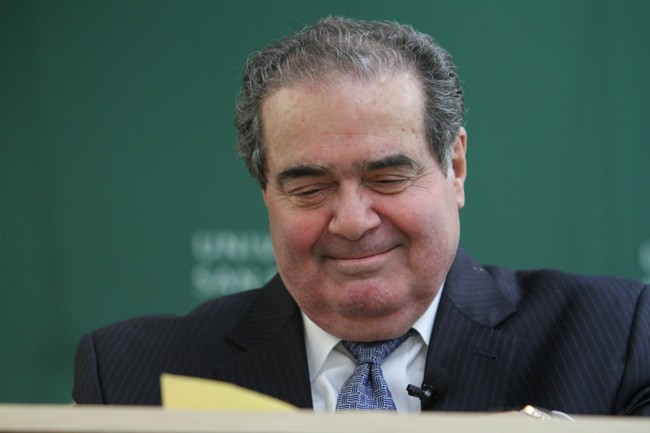
The Florida Supreme Court’s decision to discipline a former candidate for a Hillsborough County judgeship has led to a legal fight that will go before the nation’s highest court on Tuesday.
Dozens of states, organizations and individuals have filed or joined briefs before the U.S. Supreme Court, taking stances on a Florida rule barring judicial candidates from soliciting campaign donations. In all, 17 so-called “amicus” briefs have been filed with the high court, many of them signed onto by several parties.
The U.S. Supreme Court’s ultimate decision could have far-reaching ramifications, as 30 of the 39 states that elect judges have some kind of restriction on judicial candidates making personal pitches for campaign money, according to the Brennan Center for Justice at the New York University School of Law.
And it comes against the backdrop of the U.S. Supreme Court’s increased willingness in recent years to strike down some limits on campaign contributions as a violation of the First Amendment’s protection of free speech.
The Florida case centers on Lanell Williams-Yulee, who in 2009 sent out a mass mailing asking for campaign contributions during her bid for a Hillsborough County judgeship. The Florida Bar filed a complaint against Williams-Yulee, who was eventually disciplined by the Florida Supreme Court for breaking a judicial canon that bars court candidates from asking for contributions.
Lawyers for Williams-Yulee argue that the rule is both too broad and not broad enough at the same time. They question why the state doesn’t also bar solicitation of campaign contributions by legislative or executive-branch candidates and point out that other people can still raise money for judicial candidates.
“If prevention of the potential for bias is the goal, it makes no difference whether a candidate personally requests a donation from a supporter or instead instructs her campaign manager to do it for her,” the lawyers wrote. “Either way — so long as the candidate learns of the outcome of the request — the potential for bias is present.”
The brief notes that candidates can find out the names of campaign donors from public reports and are free to write thank-you notes to contributors.
At the same time, the type of mailer sent by Williams-Yulee doesn’t carry the same kind of dangers involved in a face-to-face appeal from a judicial candidate to a lawyer, the brief says.
“Solicitations conveyed through mass mailings or a request posted on a website create no serious risk of either the reality or appearance of judicial bias or quid pro quo corruption,” the brief says.
Williams-Yulee’s cause has been taken up by groups that include the American Civil Liberties Union and the ACLU of Florida, which also argue that the Florida court’s ruling infringed on her right to free speech.
But The Florida Bar and an array of allies — including other states with similar prohibitions, groups that oppose more money in politics and longtime fixtures of Florida’s legal scene — have pushed back, saying the state should be free to set rules on its judicial candidates and that the ban on those candidates personally raising funds helps fight corruption.
“While the candidate may learn the identity of a contributor, the contributor does not know at the time the contribution is made whether the candidate will learn of the contribution,” lawyers for the Bar argued. “Moreover, the candidate does not know whether the contribution was actually attributable to a relationship between the contributor and the third party money-raiser.”
Florida’s tortured history with judicial corruption has also come into play. A brief joined by three former chief justices of the Florida Supreme Court — Major Harding, Harry Lee Anstead and Stephen Grimes — and several other prominent lawyers highlights a series of scandals that rocked the state’s high court in the 1970s.
Those events led to the creation of Florida’s “merit retention” system — which got rid of contested races for appellate courts.
“The direct solicitation ban was one of many canons and other reforms adopted by the state of Florida in order to address widespread corruption and regain public confidence in the judiciary,” the brief for the justices and lawyers says. “Given its unique history, Florida has an especially compelling governmental interest in preserving the integrity of its judiciary and maintaining public confidence in an impartial judiciary.”
The U.S. Supreme Court’s ruling could come in the spring.
–Brandon Larrabee, News Service of Florida






























Rick Gardner says
Hey everybody on the ballot is up for sale why not judges??? Pathetic comment on today’s society. Not long ago in many states it was illegal for Corps to contribute to candidates. Now thanks to SCOTUS anybody with deep pockets can buy legislators and legislation.
IvaHadit says
Alas, right you are.
John Smallberries says
“In a 5-4 decision, the supreme court today has decided that judgeships, as elected positions, are free to enjoy the benefits allowed any political office. Scalia writes in the decision ‘The legal system is not one of justice but of rules, and as such people appearing before the court have no inalienable right under the constitution to expect justice. It is the opinion of the court that the founding fathers would understand the need for a tip jar near the gavel of every judge, thereby ensuring that a fair trial can be conducted.'”
Sherry Epley says
Right On Rick! Our politicians are now bought and paid for thanks to SCOTUS and Citizens United (AKA bribery is now legal). . . next will it be the judges? We need to be moving the other way and taking the money out of any kind of campaigns for public office at all levels!